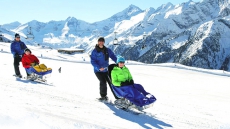Monkeys exhibit more cognitive flexibility than humans when it comes to exploring more efficient options to solving a problem, according to a study.
The study, published in the journal Scientific Reports, illustrates how humans can suffer from learned biases that can lead us to make inefficient decisions and miss opportunities.
Cognitive flexibility is the brain's ability to transition from thinking about one concept to another.
"We are a unique species and have various ways in which we are exceptionally different from every other creature on the planet. But we're also sometimes really dumb," said Julia Watzek, a graduate student at Georgia State University in the US.
The study illustrates how capuchin and rhesus macaque monkeys were significantly less susceptible than humans to "cognitive set" bias when presented a chance to switch to a more efficient option.
The results supported earlier studies with fellow primates, baboons and chimpanzees, who also showed a greater willingness to use optional shortcuts to earn a treat compared to humans who persisted in using a familiar learned strategy despite its relative inefficiency.
"I think we're less and less surprised when primates outsmart humans sometimes," Watzek said.
The test involved establishing a specific strategy to lead to a solution.
Through trial and error using a computer, monkeys and humans had to follow a pattern by pushing a striped square then a dotted square and then, when it appeared, a triangle to achieve the goal and receive a reward.
For the humans, the reward was either a jingle or points to let them know they got it right. For the monkeys, it was a banana pellet. Wrong results got a brief timeout and no reward.
After the strategy was learned, subsequent trials presented the triangle option immediately without having to push the patterned squares in sequence.
All of the monkeys quickly used the shortcut, while 61 per cent of the humans did not. About 70 per cent of all the monkeys used the shortcut the very first time it was available compared to only one human.
The study involved 56 humans, 22 capuchin and seven rhesus monkeys.
"There's a heavy reliance on rote learning and doing it the way you were taught and to specifically not take the shortcut," Watzek said of the human subjects.
"More of the humans do take the shortcut after seeing a video of somebody taking the shortcut, but about 30 per cent still don't," Watzek said.
"In another version we told them they shouldn't be afraid to try something new. More of them did use the shortcut then, but many of them still didn't," he said.
Sticking with what's familiar and proven—like a commuting route to work—isn't a big deal with a low cost over an alternative, the researchers said.
Other times, using inefficient, biased or outdated practices could have far-reaching consequences, they said.
"To set ourselves up for good decision-making, sometimes that means changing available options," Watzek said.
"I'm not proposing to topple the entire Western education system, but it is interesting to think through ways in which we train our children to think a specific way and stay in the box and not outside of it," he said.





